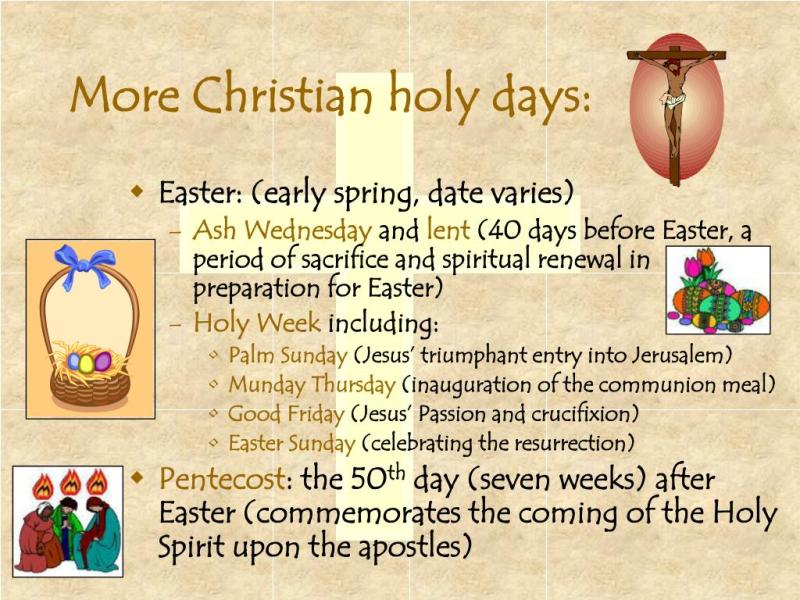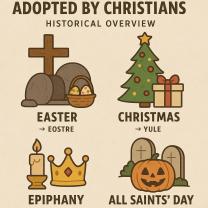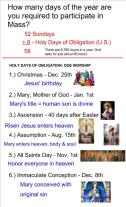What are the Christian holy days?
Christianity observes several important holy days, each with its own significance and traditions. Here are some of the major Christian holy days:
Christmas (December 25):
- Celebrates the birth of Jesus Christ. It is widely observed with gift-giving, decorations, and special church services.
Epiphany (January 6):
- Commemorates the visit of the Magi or Wise Men to the infant Jesus, emphasizing the revelation of Jesus to the Gentiles.
Lent (40 days leading to Easter):
- A period of penance, fasting, and reflection leading up to Easter. It begins on Ash Wednesday and lasts for 40 days, excluding Sundays.
Good Friday (Friday before Easter):
- Observes the crucifixion of Jesus Christ. It is a day of solemn reflection and church services.
Easter (date varies, usually in March or April):
- Celebrates the resurrection of Jesus from the dead. It is the most significant event in the Christian calendar.
Ascension Day (40 days after Easter):
- Marks the ascension of Jesus into heaven after his resurrection.
Pentecost (50 days after Easter):
- Celebrates the descent of the Holy Spirit upon the apostles. It is often considered the birthday of the Christian Church.
Feast of the Assumption (August 15):
- Commemorates the Virgin Mary's bodily assumption into heaven.
All Saints' Day (November 1):
- Honors all saints, known and unknown. It is followed by All Souls' Day, which commemorates the faithful departed.
Advent (four Sundays before Christmas):
- Marks the beginning of the liturgical year and anticipates the coming of Jesus. Advent is a time of preparation and expectation.
Feast of the Immaculate Conception (December 8):
- Celebrates the belief that Mary was conceived without original sin.
These holy days vary among Christian denominations, and different cultures may have unique customs associated with these observances. The significance and practices can also differ between Eastern Orthodox, Roman Catholic, Protestant, and other Christian traditions.
Observing sacred traditions: What are the Christian holy days and their significance?
Christianity is one of the world's most prominent religions, with over 2.4 billion adherents worldwide. As a faith deeply rooted in history and tradition, Christianity observes several holy days that hold immense religious and historical significance. These holy days commemorate pivotal events in Christian history, celebrate the life and teachings of Jesus Christ, and provide opportunities for reflection, spiritual growth, and community engagement.
Major Christian Holy Days
Christmas: Celebrated on December 25th, Christmas commemorates the birth of Jesus Christ, considered the central figure of Christianity. The holiday is marked by festive celebrations, religious services, and the exchange of gifts.
Easter: Easter is the most significant holiday in the Christian calendar, commemorating the resurrection of Jesus Christ, symbolizing the triumph of life over death and the promise of salvation. Easter Sunday falls on the first Sunday after the first full moon following the spring equinox.
Good Friday: Preceding Easter Sunday, Good Friday commemorates the crucifixion of Jesus Christ on Calvary Hill. It is a day of solemn reflection and repentance, often marked by fasting and prayer services.
Holy Thursday: Observed on the Thursday before Easter, Holy Thursday commemorates the Last Supper, during which Jesus washed his disciples' feet and instituted the Eucharist, a sacrament symbolizing his body and blood.
Ash Wednesday: Ash Wednesday marks the beginning of Lent, a 40-day period of fasting, prayer, and reflection in preparation for Easter. It is a day of repentance and self-examination, often observed by receiving ashes in the form of a cross on the forehead.
Significance of Christian Holy Days
Christian holy days hold immense religious and historical significance, serving as reminders of the core beliefs and traditions of the faith. They provide opportunities for:
Commemorating Events: Holy days commemorate pivotal events in Christian history, such as the birth, crucifixion, and resurrection of Jesus Christ, reinforcing the foundation of the faith.
Celebrating Beliefs: Holy days celebrate central tenets of Christianity, such as the love of God, the sacrifice of Jesus Christ, and the promise of salvation, reaffirming faith and devotion.
Spiritual Growth: Holy days provide opportunities for reflection, prayer, and spiritual renewal, fostering a deeper connection with God and strengthening one's faith.
Community Engagement: Holy days bring together Christians from diverse backgrounds, fostering a sense of belonging, unity, and shared purpose.
Tips for Meaningful Observance
Attend Religious Services: Participating in religious services on holy days provides an immersive experience, allowing for collective worship, prayer, and reflection.
Read and Reflect on Scriptures: Dedicate time to reading and reflecting on relevant passages from the Bible, deepening understanding of the significance of the holy day.
Engage in Acts of Service: Volunteer your time or donate to organizations aligned with Christian values, embodying the spirit of love and compassion.
Engage in Personal Prayer and Reflection: Set aside time for personal prayer and reflection, seeking guidance, solace, and spiritual growth.
Connect with Loved Ones: Spend time with family and friends, strengthening bonds and sharing the joy and meaning of the holy day.
Practice Self-Reflection and Repentance: Reflect on one's actions and seek forgiveness, aiming for personal growth and spiritual renewal.
Limit Distractions: Minimize distractions and engage fully in the activities and traditions associated with the holy day, enhancing the spiritual experience.
By incorporating these tips into the observance of Christian holy days, individuals can deepen their understanding of their faith, strengthen their connection with God, and foster a sense of community and shared purpose.












